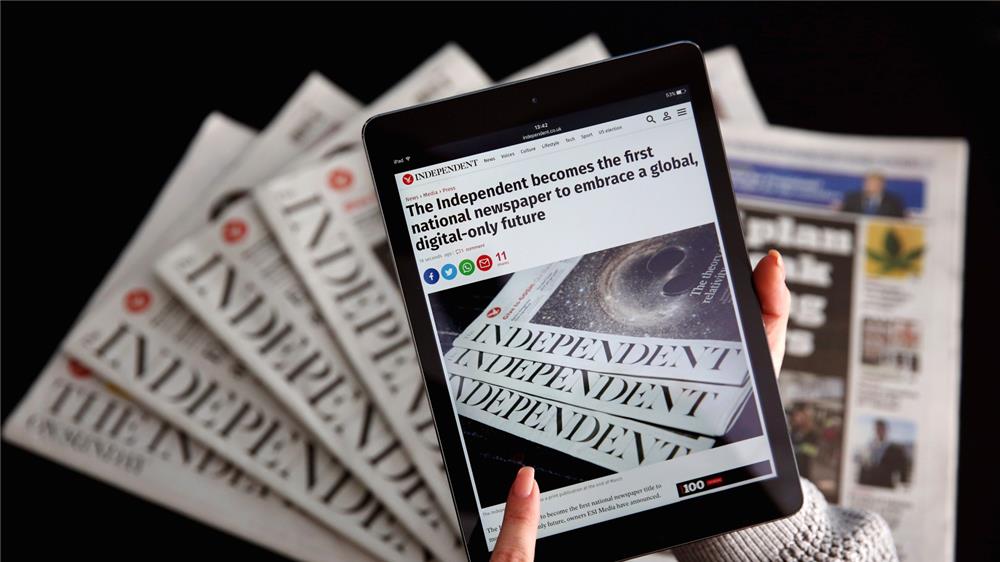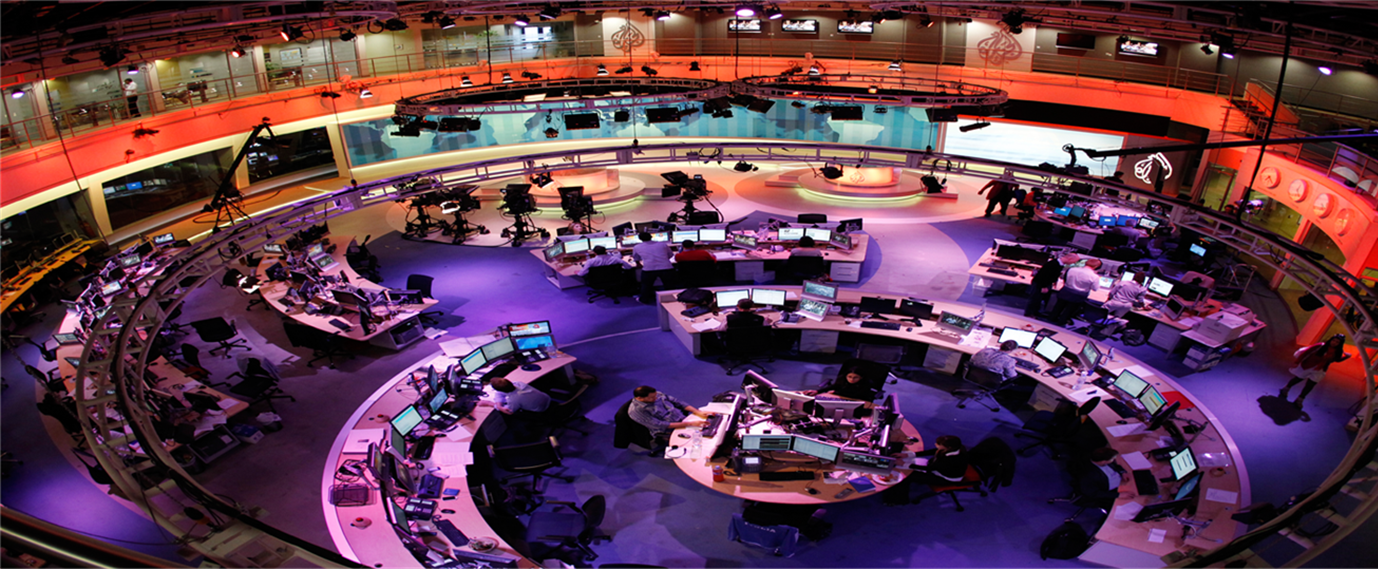لم تعد شبكات التواصل الاجتماعي تقود التحولات في صناعة الإعلام والاتصال فحسب، بل باتت تؤسس لإرساء قواعد وأنماط ومعايير غير مسبوقة في تكوين المجتمعات البشرية، وما يترتب على ذلك من تشكيل للهوية الرقمية والشخصية الرقمية على مستوى الأفراد وعلاقاتهم من جهة، وعلى مستوى القوى الجديدة أو الإمبراطوريات الرقمية الناشئة والمؤسسات الإعلامية من جهة أخرى.
ثمة تحديات تواجه كبرى المؤسسات الإعلامية التقليدية في محاولة الإجابة على الأسئلة التالية: ما هي انعكاسات تلك التطورات على غرف الأخبار في البيئات الإعلامية التقليدية؟ وكيف يمكن لتلك المؤسسات أن تواكب الجديد؟ وكيف تقود عملياتِ التحول بسلاسة تَبْني على ما هو موروث وأصيل من القواعد المهنية الصحفية في المحافظة على المصداقية والدقة، مع استيعاب ما هو قادم من ثورة في تغيير قواعد صناعة الإعلام؟
لعله من المهم أن نستعرض أبرز عمليات أو مظاهر التحول التي أوجدتها "الصحافة الرقمية" في محاولة استيعاب ما هو جديد في تلك الصناعة، وكيف يمكن أن نؤسس لغرف إخبارية ذكية تتجاوز الوظائف التقليدية.
1- المعلومة في العوالم الرقمية.. ما العمر الافتراضي لبقائها حية أو متفاعلة؟ وكيف يمكن طمرها أو إعادة إحيائها؟
خلافا لما هو متداول في غرف الأخبار التقليدية من وجود أطر زمنية مرتبطة بضرورة إنهاء النشرة الإخبارية في وقت بعينه مما يؤثر بشكل كبير على تحديد العمر الزمني للنشرة في مجال التداول والمشاهدة والتفاعل، فإن تلك الأنماط المحددة بالزمن لم تعد تستحوذ على انتباه المشاهد أو المتفاعل كما كانت في السابق، خصوصا في ما يتعلق بالمواد الخبرية، إذ ثمة تحول مهم في طرق وآليات الحصول على المعلومة وكيفية استهلاكها أو تحديد صلاحية فاعليتها. لتوضيح ذلك، من منا يمكنه أن يشاهد نشرة أخبار الأسبوع الفائت، بينما المحتوى في العالم الرقمي لم يعد له "انتهاء للصلاحية"؟.. أي أننا اليوم أمام تحدٍّ أو لنقل فرصة لإعادة التفكير في إنتاج محتوى لا يموت. لكن يبرز تحدٍّ من نوع جديد يتمثل في إبقاء المحتوى متفاعلا دون ضياعه أو إخفائه عن قصد أو دون انتباه.
ثمة تحولات جذرية تشهدها محركات البحث تؤسس لمنظومات مذهلة في إتاحة فرص تتجاوز البحث عن الأشياء المجردة؛ إلى البحث عن العلاقات المتعدية بين الأشياء.
إذا كانت محركات البحث لدى غوغل اليوم تعد من أهم مرجعيات البحث في الإنترنت والتي يعتمد عليها الصحفيون والمنتجون والعاملون في الغرف الإخبارية، فنحن أمام جيل جديد من محركات وخوارزميات البحث تقودها إمبراطورية الفيسبوك الناشئة بمواصفات وإمكانيات ونتائج قد تكون مفاجئة و صادمة. ففي الوقت الذي تستطيع أن تبحث فيه عن الأشياء المجردة في غوغل، يتجاوز الفيسبوك ذلك في إمكانية البحث عن العلاقات المتشكلة بين الأشياء والأشخاص، بل يذهب بعيدا في إمكانية البحث عن العلاقات الناشئة عن العلاقات، والمعلومات عن المعلومات والعلاقات معا. ولتبسيط الفكرة، يمكننا اليوم مثلا أن نبحث عن الصحفيين العاملين في شبكة الجزيرة الذين قرؤوا كتابا ما والموجودين في بقعة جغرافية معينة ونتعرف إلى مدى إعجابهم أو تفاعلهم مع الكتاب، أو نبحث في طبيعة العلاقات بين مجموعات معينة وأشياء أخرى مع توصيف للمكان والزمان والمحيط بأبعاده المختلفة..

3- جمع الأخبار (News Gathering)
يعتمد جمع الأخبار بالشكل التقليدي على وكالات الأنباء والمراسلين والصحفيين المنتشرين في أرجاء المعمورة، لكن هذا الأمر لم يعد كافيا لتغطية الأحداث بسبب تسارع إيقاعها. ومع ظهور منصات التواصل الاجتماعي وانتشار مفهوم المواطن الصحفي، تحولت تلك المنصات إلى واحدة من أهم وسائط جمع الأخبار ومتابعة تفاعلاتها وتداعياتها، فأصبح تويتر منافسا حقيقيا لوكالات الأنباء، بل تعدى في كثير من الأحيان سرعة نقل الخبر ورصده وتفاعل الجمهور معه. اليوم أصبح معظم الشخصيات العامة والمسؤولين والهيئات الرسمية الحكومية وغير الحكومية يغردون مباشرة دون الحاجة إلى التصريح عبر وكالات الأنباء أو المؤسسات الإعلامية. أما على صعيد شهود العيان وإثراء المحتوى من المواطنين، فنحن اليوم أمام كمٍّ هائل من المواد والمحتوى بأشكاله المختلفة (نصوص وصور وفيديوهات) يتجاوز حجمها في الساعة الواحدة ما تنتجه مجموع المؤسسات الإعلامية التقليدية في عشرات السنين.
وبناء عليه، فإن ما نراه من فرص في جمع الأخبار ورصدها عبر منصات التواصل الاجتماعي سيشكل العمود الفقري في الصناعة الخبرية والإعلامية، خصوصا في طرق وأساليب التعاطي مع المعلومات الضخمة وإخضاعها للتحليل والنقد والتوظيف. كما ستشهد الغرف الإخبارية الذكية أنماطا جديدة في بيئات العمل تتطلب مواكبة فاعلة للتعاطي مع هذا الكم الهائل والمتزايد من المعلومات في ما يتعلق بتأهيل الكوادر البشرية وتوظيف الأدوات وتغيير منظومات العمل.
4- إنتاج المحتوى بأشكاله المختلفة
تتداخل اليوم لغة الصورة الثابتة والمتحركة (الفيديوهات) مع النص المرئي والمسموع بشكل غير مسبوق، حتى أصبحت المؤسسات والصحف لا تقتصر على إنتاج محتوى مقروء، بل دخلت في صناعة المحتوى المرئي والمسموع، والعكس صحيح أيضا. ويعود الفضل في ذلك إلى ما أتاحته الوسائط والتقنيات الجديدة من سهولة الإنتاج والنشر والتوزيع. غير أننا اليوم نشهد ميلاد أشكال وأنماط جديدة في صناعة المحتوى الرقمي، تتداخل فيها العناصر مجتمعة من صوت وصورة ونص ومؤثرات حسية لا تحتاج إلى أن تكون القصة الخبرية فيها منتجة بشكل خطِّي، بل بدأت تتشكل أنماط وقوالب جديدة في إنتاج قصص خبرية بطريقة ليست خطية (Non-Linear)، أي أن القصة الخبرية بشكلها الجديد يمكن أن تجذبك لو بدأت بها من آخرها أو وسطها أو أولها. وبهذا ستشهد غرف الأخبار الذكية نقلة نوعية أو طفرة في صناعة ما يسمى "MultiMedia storytelling".
5- التحقق والتثبت
في ظل الاعتماد المتزايد على منصات التواصل الاجتماعي في جمع الأخبار ونقلها ورصدها، بات لزاما على الغرف الإخبارية إنشاء طرق وآليات للتحقق والتثبت من الأخبار والصور والفيديوهات القادمة من المواطن الصحفي أو من مصادر مجهولة. وهنا، لا بد من الإشارة إلى ضرورة تعاون وتشارك الصحفيين بما يملكونه من قدرات ومهارات النقد الصحفي ومراعاة السياسة التحريرية، مع الاستفادة من التقنيات والأدوات وطرق البحث والتحري المتجددة.
6- النشر والتوزيع
لم تسهِّل منصات التواصل الاجتماعي آليات النشر والتوزيع فحسب، بل شكلت أنماطا جديدة في طرق استهلاك المحتوى والتفاعل معه.. فعلى سبيل المثال، جمع الشريط الإخباري على الفيسبوك ما بين الأخبار من المؤسسات الإعلامية والأخبار من الأصدقاء والأشخاص والمواد الدعائية، في ترتيب زمني متداخل غير خطي. كما أن قواعد النشر والانتشار والتفاعل باتت خاضعة بشكل كبير لأصحاب المنصات، فامتلاك مئة مليون متابع أو معجب لا يعني بتاتا أنني يمكن أن أصل إليهم جميعا في نفس الوقت، كما أنه لا ينطوي على أي نوعية من الملكية لهذا الجمهور. وفي الوقت الذي كانت فيه شركات الاتصالات (ساتلايت، كبلات.. إلخ) مجرد وسيط ناقل للمواد، أصبحت شبكات التواصل الاجتماعي المالك للجمهور، وهي من يحق لها إيصال المحتوى كيفما تشاء. ولعله من اللافت أن دور منصات التواصل الاجتماعي في عمليات التوزيع تجاوز -بمراحل بعيدة- التوزيع التقليدي في الانتشار الأعمى، إلى المعرفة التفصيلية بالجمهور المستهدف، مع القدرة على تطويع الزمان والمكان والحال في إيصال المحتوى، إلى جانب تحديد الفئات المستهدفة بدقة.
7- التفاعل مع الجمهور
من أبرز التحديات التي تواجه الإعلام التقليدي اليوم، القدرة على الانتقال من الخطاب الفوقي المستعلي الذي تَعَوّد على الحديث باتجاه واحد؛ إلى ممارسة جديدة تنطلق من فكرة المشاركة والتواصل باتجاهين، أو ما يسمى التفاعل مع الجمهور والاستماع له بدرجة عالية من الاحترام والمهنية، في ما يطلق عليه خدمة الجمهور، وعدم الاكتفاء بنشر المحتوى دون معرفة رجع الصدى والاستجابة الفاعلة في السماح لوجهات النظر المختلفة مع الدخول في حوار مباشر مع الجماهير.
اللافت أن شبكات التواصل الإجتماعي تجاوزت مرحلة التواصل باتجاهين إلى تواصل متعدد الاتجاهات، ومكنت المستخدم من تجاوز المؤسسة الصحفية في الحضور الرقمي والتواصل مع الجماهير بشكل مباشر دون الحاجة إلى الحضور عبر القنوات الإعلامية التقليدية.
انعكس ذلك على تشكيل ما يمكن أن نسميه "المتفاعل الذكي" في مقابل المشاهد السلبي، فالجمهور الرقمي لم يعد يستسيغ التوجيه والخطاب المصمت، بل أصبحت أدوات النقد والتحليل والمقارنة ومن ثم إمكانية المشاركة والرد، تُحرج في كثير من الأحيان كبرى المؤسسات الإعلامية.
وهكذا، فقد بات لزاماً على الغرف الإخبارية الذكية أن تتعاطى مع "شريك ذكي" تفهم احتياجاته وتدرك واقعه وتحترم عقله. مع ضرورة الانتباه إلى سرعة تطور قدرات هذا "المتفاعل" يوماً بعد يوم على صعيد الذوق والحس الصحفي والسلوك الرقمي المعقد.
8- المعلومات الإحصائية وتغيير أدوات القياس ومعاييره
بينما لا تستطيع القنوات التلفزيونية الفضائية معرفة معلومات إحصائية رئيسية كعدد مشاهدي القناة مثلا، تقود شبكات التواصل الاجتماعي طورًا غير مسبوق في تقديم معلومات إحصائية تفصيلية لا تتوقف عند حدود معرفة أعداد المشاهدين وطرق المشاهدة ونوعيتها ووقتها، بل يمكن تحديد مدد المشاهدة بالثواني ومع من تشاهد وماذا شاهدت سابقاً وماذا تشاهد الآن. الأمر يذهب إلى أبعد من ذلك بكثير في معرفة الجمهور الذي يمكن أن تحدد فيه وبدقة غير معهودة أدق التفاصيل حول المكان والزمان والحالة الشخصية، كما تستطيع قياس مدى التأثر والارتباط والتفاعل وشدة الانتباه للقارئ أو المشاهد أو المتفاعل. وتكمن الطفرة الجديدة بهذه العوالم في إمكانية قياس ورصد ومتابعة كل شيء.. نعم كل ما لم يخطر على بالنا من قبل.
فإذا كانت العوالم التقليدية تتيح قياس جزء بسيط من المعلومات في الماضي، فإن الغرف الإخبارية الذكية تستطيع أن تقيس وترصد الماضي والحاضر "الآني"، كما أنها تعمل على التنبؤ بالمعلومات المستقبلية. قد نتفاجأ إذا علمنا أنه بمقدورنا اليوم أن نعرف كم عدد من سيشاهد برنامجاً ما، أو من سيقرأ مقالا ما وبنسبة دقة تتجاوز 90%.
9- صحافة الخوارزميات وبناء قواعد البيانات
يشير مصطلح "خوارزمية" إلى نوع من البرمجيات الحاسوبية مبنية على مجموعة من الفرضيات والحسابات والمعادلات التي تنفذ تعليمات بناءً على مدخلات ثابتة أو متغيرة. وأهم ما يميز هذه البرمجيات قدرتها الهائلة على التعامل مع البيانات الضخمة، وقدرتها على النمو والتطور الذاتي.
تلعب الخوارزميات اليوم دورًا محوريًّا في صناعة الإعلام على مستوى النشر والتوزيع، خصوصًا لدى محركات البحث في الإنترنت، لكن الأمر أصبح أكثر استخدامًا في منصات التواصل الاجتماعي في تحديد توصيل المحتوى إلى المستخدم بشكل تلقائي أو انتقائي.
من جهة أخرى، أصبح من الصعب مواكبة ومتابعة الكم المتزايد من المعلومات يدويًّا دون الحاجة إلى مساعدة الحواسيب في عمليات الرصد والمتابعة والتحليل، الأمر الذي يمكّن غرف الأخبار من متابعة ورصد ملايين النشطاء والفاعلين، والاستفادة المتجددة في السبق الصحفي على مستوى الروايات الخبرية الجديدة أو الزوايا الخبرية من خلال رصد ومتابعة ارتدادات الخبر وتفاعلاته من جهة، وإمكانية قياس معدلات الارتباط والتأثير من جهة أخرى.
وتجدر الإشارة إلى أن وكالة أنباء أسوشيتد برس (AP) تنتج ما يزيد عن 3500 تقرير أو قصة كل ثلاثة أشهر، معتمدة على الخوارزميات. وهذا الرقم مرشح للوصول إلى 4500 قصة، أي ما مجموعه 18 ألف قصة في السنة.
لعل التحول اللافت والمهم في ما هو قادم في عالم الصحافة، هو ضرورة الانتباه إلى أهمية انتقال الغرف الإخبارية اليوم من مجرد منتج للمحتوى إلى مقدّم لخدمات إخبارية وإعلامية ذكية ترتكز بشكل رئيسي على إدارة الحوار، وبناء أو تشكيل مجتمعات رقمية تستطيع من خلالها تعزيز الثقة والمصداقية، وتتمكن من زيادة معدلات الارتباط والاستحواذ على انتباه عقل الإنسان وقلبه.








































